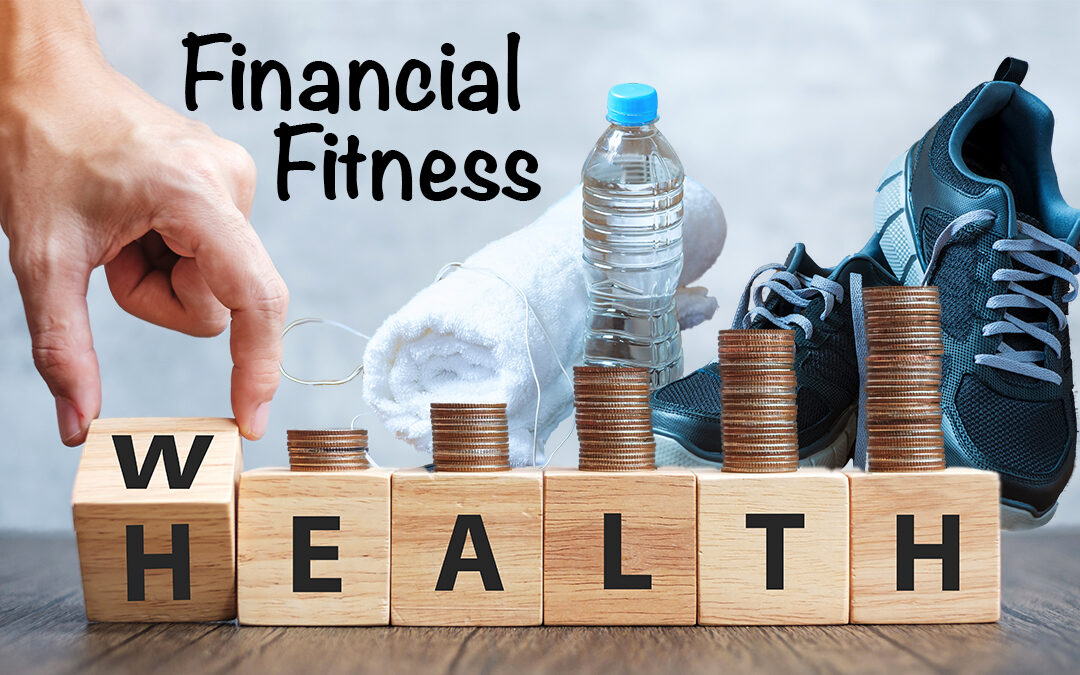Financial Fitness is just as important as Physical Fitness. So many of us start the new year with a health goal in mind, which is a great objective. However, your financial wellness also needs a good, long, look in the mirror. Among its many designations, January is Financial Wellness Month.
The timing is perfect because you’ve likely just plowed through some of your savings for holiday gift-giving, and now face tax season in the coming few months. As January’s frigid temperatures may keep you indoors a bit more than usual, take the time to do something good for your finances. Make a plan you can stick to!
Take a Snapshot
Just as the scale gives fitness fans a baseline, Consumerfinance.gov offers a questionnaire to help bring to light your current financial picture. With any pursuit, you have to know where you are to determine where you want to end up. Take the time to step back and look at the big picture. Once you know your current state, plan for success by creating short-term objectives that will help you reach more long-term goals.
Plan for Success
When deciding on a goal and objectives, put them in order of priority and make sure they are SMART!
- Specific – Be specific with your goal and objective setting. Don’t say, “I want to save money.” Say, “I want to save $5,000 for a trip to Italy, 2 years from now.”
- Measurable – Calculate how much a month you’ll need to set aside to reach the objective. “I’ll need to put $225 a month into my vacation savings account to do so.”
- Attainable – Make sure you can afford the goal. Don’t overextend yourself and then get behind on other expenses. Start small, if needed, and work your way toward the finish line.
- Relevant – Is this goal important to you? It’s difficult to stick with a goal unless you’re fully committed to seeing it through.
- Time-bound – Set a deadline. In this example, it’s 2 years but it could be 3 months from now or 5 years. You decide what works.
You are more likely to follow through on a plan that you’ve toiled over a bit and taken the time to write down. Just getting it out of your mind and onto paper (or screen) makes the goal less of a whim and more of a proclamation. Keep the above guidelines in mind when working through the logistics. Visit Consumerfinance.gov for budget worksheets that make it easy to plug in numbers and break down your savings goals into specifics. These are helpful tools that anyone can use including teens and young adults who may need to get a better handle on finances before leaving the nest.
Make it Automatic
When you tally up your monthly expenses you may not see a place for savings, but any amount adds up if you do it consistently. Set up a percentage of your earnings to go automatically into a savings account. Months from now, you’ll see a lump sum that is way more exciting than finding a $20 bill in the dryer. This is a great way to save for holiday shopping or future vacations.
Put recurring bills on Autopay so you don’t miss due dates. This is especially helpful when the payment amount is consistent. Mortgage payments, student loans, and car payments are just a few more bills to consider for autopay. As for credit cards, it is best to pay them off each month but as a backup option, you can set autopay at the minimum balance. That way, you don’t miss a payment. Missing a credit card payment can hurt your credit score and lead to a costly late fee. Keep in mind, autopay can be helpful but you still need to keep tabs on the money leaving your accounts.
Keep it in Check
Keep a check register and balance it regularly. Yes, keeping track of your checking account register is still an important task! Online banking and the increased use of debit cards have made balancing a checkbook a thing of the past for many people. If you’ve forgotten its importance, here is your reminder. Keeping a check register forces you to have eyes on your money and your spending habits. It can also help identify errors from banks and merchants and could protect you against fraud. You may even see areas for savings. If you go to the same ATM every Friday to get cash out and are charged a $3 fee for doing so, seeing that repeated strike against your balance may prompt you to change that habit… even if it’s just out of principle. Forbes Advisor offers a refresher on the very important task of balancing a check register, including digital options that you may feel are more in line with the times.
Expect the Unexpected
Don’t you love spending your hard-earned money replacing large, expensive household items like washing machines and dryers? How about putting thousands of dollars down to fix a flooded basement? No one wants to think about these costly situations. Unfortunately, these financial strains can be a homeowner’s reality at times. Other unexpected emergencies could include job loss or illness. The only way to make these realities less painful is to already have money set aside in case they crop up. If you haven’t already started an emergency account, take the time to set one up.
Don’t Forget to Breathe
There is an actual health benefit in staying ahead of your finances. In a study conducted by the American Psychological Association, 65% of respondents said that money is a significant source of stress. Health issues, physical and mental, can be triggered by stress and anxiety. Facing money worries head-on, although seemingly daunting, can be the best course of action. According to an article from Big Think, budgeting can ease financial stress by helping you feel more in control.
Cheers to you for a prosperous New Year… gained through your resolve to get financially fit in 2023!


